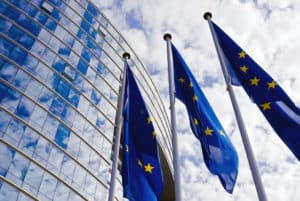 The European Commission has completed its investigation into an FX spot trading cartel known as Sterling Lads, by fining five global banks a total of €344 million ($390 million).
The European Commission has completed its investigation into an FX spot trading cartel known as Sterling Lads, by fining five global banks a total of €344 million ($390 million).
A total fine of £261 million was imposed on the four banks that decided to settle the case, namely UBS, Barclays, RBS and HSBC, who benefited from substantial reductions in their fines by cooperating with the Commission’s investigation. The Commission also fined Credit Suisse €83 million under the ordinary procedure. HSBC will pay the biggest fine, in excess of $174 million.
The Commission’s investigation revealed that some traders in charge of the forex spot trading of G10 currencies, acting on behalf of the fined banks, exchanged sensitive information and trading plans, and occasionally coordinated their trading strategies through an online professional chatroom called Sterling Lads.
The information exchanges enabled the traders to make informed market decisions on whether and when to sell or buy the currencies they had in their portfolios, instead of acting independently from one another and taking an inherent risk in making these decisions.
According to the Commission, these information exchanges also allowed the traders to identify opportunities for coordination, for example through a practice called “standing down”, whereby some of them would temporarily refrain from trading to avoid interfering with another trader.
“Today we complete our sixth cartel investigation in the financial sector since 2013 and conclude the third leg of our investigation into the Foreign Exchange spot trading market.,” Commissioner Margrethe Vestager, in charge of competition policy stated. “Our cartel decisions to fine UBS, Barclays, RBS, HSBC and Credit Suisse send a clear message that the Commission remains committed to ensure a sound and competitive financial sector that is essential for investment and growth.” Vestager said the collusive behaviour of the five banks undermined the integrity of the financial sector at the expense of the European economy and consumers.
The foreign exchange or forex market is the largest financial market in the world with a daily trading volume of $6.6 trillion, according to the 2019 Triennial Central Bank Survey of FX and OTC derivatives markets. But it is also one of the more opaque financial markets as most trades are conducted over-the-counter (OTC) and based on credit relationships.
The Commission’s investigation focused on the trading of G10 currencies, which are the most liquid and traded currencies worldwide. The main customers of forex traders include asset managers, pension funds, hedge funds, major companies and other banks.
In setting the fines, the Commission said it took into account, the sales value in the European Economic Area (‘EEA’) achieved by the cartel participants for the products in question, the serious nature of the infringement, its geographic scope and its duration.
Under the Commission’s 2006 Leniency Notice, UBS received full immunity for revealing the existence of the cartels, thereby avoiding an aggregate fine of circa €94 million. Barclays, RBS, and HSBC benefited from reductions to their fines for by cooperating with the Commission’s investigation. The reductions reflect the timing of their cooperation and the extent to which the evidence they provided helped the Commission prove the existence of the cartel in which they were involved.
In addition, under the Commission’s 2008 Settlement Notice, the Commission applied a reduction of 10% to the fines imposed on Barclays, HSBC, RBS and UBS, in view of their acknowledgment of participation in the cartel and of their liability in this respect.
Since Credit Suisse did not cooperate under the leniency or settlement procedures, it did not benefit from any reductions granted within those frameworks. The Commission has however granted a total reduction of 4% to reflect the fact that Credit Suisse is not held liable for all aspects of the case.
The Commission’s decision in the Sterling Lads case completes its wider forex investigation. Two infringements were concluded with settlement decisions adopted in May 2019:
- The Forex (Three Way Banana Split)settlement decision concerned communications in three different, consecutive chatrooms (“Three way banana split / Two and a half men / Only Marge”) among traders from UBS, Barclays, RBS, Citigroup and JPMorgan. The infringement started on 18 December 2007 and ended on 31 January 2013.
- The Forex (Essex Express)settlement decision concerned communications in two chatrooms (“Essex Express ‘n the Jimmy” and “Semi Grumpy Old men”) among traders from UBS, Barclays, RBS and Bank of Tokyo-Mitsubishi (now MUFG Bank). The infringement started on 14 December 2009 and ended on 31 July 2012.